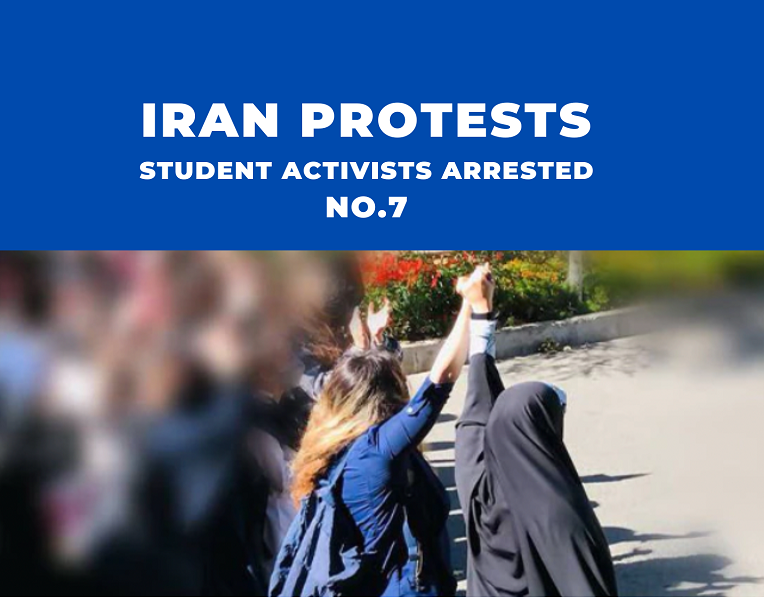For nearly four months, student groups at over 144 universities across Iran have mobilized to protest the death in custody of Mahsa Amini. The peaceful protests and sit-ins organized by university students in demand of justice have been met with violence and arrests. According to reports, over 600 university students have been arrested since the start of the protests. Many students have also faced academic suspensions and other such disciplinary actions. Female students, who continue to stand at the forefront of the demonstrations to protest the systematic and violent crackdowns by security forces, also face academic suspension, disciplinary action, detention, and court cases.
On December 7, Iranian universities organized broad protests and sit-ins in commemoration of National Student day. They demanded justice for Mahsa Amini and those killed during protests, and called for the release of thousands of protesters, including student activists detained over the last 4 months.
National Student Day، 16th of Azar marks the anniversary of the murder of three students at University of Tehran on December 7, 1953 by police, during the Pahlavi regime. The day has been commemorated by a student groups at universities across Iran and has become a day of collective action in demand of democratic rights and freedoms, including freedom of speech and assembly.
This year, the students commemorated December 7 with demonstrations, sit-ins, and strikes around the country, objecting to the violent suppression of protests around the country and especially in ethnic minority areas, such as Kurdistan and Baluchistan.
They further protested widespread crackdowns and use of violence by security forces at universities, mass arrests of student activists, and broad based disciplinary actions against students, including suspensions and bans on continuation oftheir educations. Major protests, sit-ins and strikes were held in Arak, Isfahan, Tehran,Babol, Karaj, Zahedan and Kurdistan.
The violence that security forces have used against peaceful student activists overthe last four months has been concerning. For example, in October 2022, security forces stormed the campus of Sharif University of Technology, where students were peacefully demanding the release of their arrested peers. Security forces used live ammunition and tear gas, beat students, and arrested many of them. Another example is the arrest of over 100 students on November 15 at Razi University of Kermanshah, where security forces raided the dormitories.
The majority of the over 600 university student activists arrested since the start of national protests continue to remain in prison. Many have received academic suspension and other forms of disciplinary measures, including bans on the continuation of their education.
Female students, who are often at the forefront of university protests, are targeted by security forces and universities in a multitude of ways. Female students are facing an array of pressures, including academic suspension, bans from entering campus and dormitories as well as full bans on continuation of their education. Some female students are being punished by universities and through judicial cases for removing their hijabs during university protests. . These students are often identified through surveillance and the use of security cameras installed on campuses. Students living in dormitories are especially vulnerable to academic reprisals, as they risk losing their housing, making it difficult for them to continue their studies.
Detentions tend to be one of the greatest pressures facing university student activists, especially female students. These detentions often last weeks and even months, with poor prison conditions, accompanied by harsh interrogations, during which the detained have no access to lawyers of their choice and often don’t know the charges they face. Student rights groups believe these measures are intended to silence and quell university protests. Student activists who are released from detention on bail, often large sums difficult for most families to put up, will have to appear in court and (depending on the charges against them) they may face long prison sentences. Some student activists have already been sentenced to prison terms ranging from 2-6 years.
These prison terms and the pressures on student activists, many of them young and unknown, will in likelihood receive less public attention given the violence and long term prison sentences that many protesters or better known activists are facing,. Still, these sentences are significant and deserve publicity. Some Iranian activists are working on creating study opportunities for students who have been expelled from university and face permanent education bans, as a result of their activism.
This current report, number 7 in a series, documents the cases of 58 female university students arrested. This is the second report by Femena focused on documenting the arrest of female student activists, the first of which was published October 2022. Femena recognizes the actual numbers of student activists detained since the start of the protests is higher than reflected in our reports. We have included only cases which we have been able to verify. Femena will continue to document future arrests and will provide updates on the cases already documented as much as possible. We urge international human rights organizations, UN mechanisms, and feminist movements and organizations to follow the cases of student activists detained and provide them with support in order to ensure their safety during detention and eventual release.


